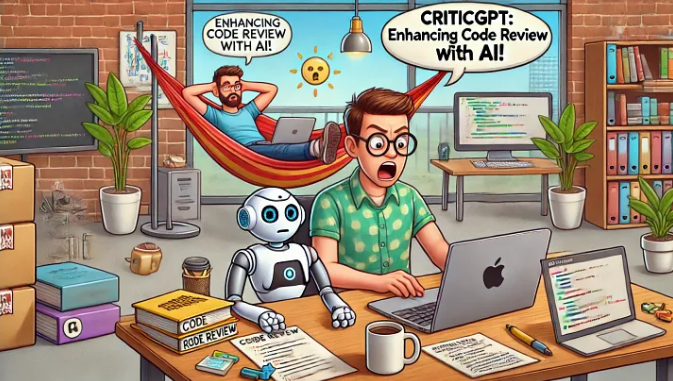CriticGPT: Revolutionizing AI-Assisted Code Review (GS Paper 3, Science & Technology)

Introduction
- CriticGPT is a powerful AI tool developed using OpenAI’s GPT-4 model, designed to assist AI judges in identifying errors in ChatGPT-generated code.
- This innovative tool aims to enhance the accuracy and stability of code by detecting bugs that human reviewers might miss, marking a significant advancement in AI-assisted code review.
Research and Development
- The creation of CriticGPT is thoroughly documented in a research paper titled “LLM Critics Help Catch LLM Bugs.”
- To refine the AI’s error-detection capabilities, researchers trained CriticGPT with a dataset exclusively composed of intentionally incorrect code.
- This rigorous training process enabled CriticGPT to identify and report code errors with exceptional precision.
- The study's findings indicate that human annotators preferred the critiques provided by CriticGPT over those from human judges 63% of the time, especially when identifying mistakes related to large language models (LLM).
- This high level of acceptance underscores the programming community's readiness to embrace AI-generated critical comments.
Innovations in Review Techniques
- CriticGPT incorporates a cutting-edge technique known as “Force Sampling Beam Search” to assist human critics in producing more detailed and comprehensive reviews.
- This method significantly reduces the risk of "hallucinations," where AI erroneously identifies non-existent or irrelevant errors.
- One of the most noteworthy features of CriticGPT is its customizable error detection capability.
- Users can adjust the thoroughness of error detection to find an optimal balance between identifying genuine bugs and minimizing unnecessary "error" flags.
- This flexibility allows for a tailored review process that meets specific project needs.
Economic and Environmental Benefits
- The establishment of the bioplastic park is expected to deliver numerous economic benefits.
- The project will create a significant number of jobs, providing new employment opportunities for local residents and stimulating the regional economy.
- Additionally, the development of the bioplastic industry will support related sectors, fostering overall economic growth in the region.
- From an environmental perspective, the transition from petrochemical plastics to bioplastics could lead to a substantial reduction in pollution.
- Traditional plastics contribute significantly to environmental degradation, accumulating in landfills and oceans and causing harm to wildlife and ecosystems.
- Bioplastics, being biodegradable, offer a viable solution to this problem, breaking down more naturally and reducing the long-term environmental footprint of plastic waste.
Advancing Technology and Research
- Beyond its immediate economic and environmental impacts, the bioplastic park aims to become a hub for technological innovation and research.
- The facility will focus on developing new technologies for plastic production, recycling, and waste reduction.
- By providing a collaborative environment for scientists and experts, the park will drive advancements in bioplastic technology, leading to more efficient production methods and new applications for bioplastics.
- This research and development focus will not only enhance the park’s economic viability but also contribute to global efforts to find sustainable solutions to plastic pollution.
Conclusion
- CriticGPT stands as a remarkable leap forward in the realm of AI-assisted code review.
- By integrating the robust features of GPT-4 with specialized training and innovative techniques, it significantly improves the code review process.
- While it excels in many areas, its limitations in handling complex and lengthy coding tasks highlight the need for continued development.
- Nonetheless, CriticGPT’s ability to provide precise and reliable error detection marks a significant milestone in enhancing the efficiency and accuracy of software development.


